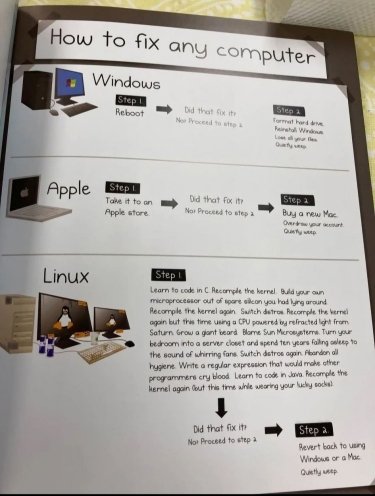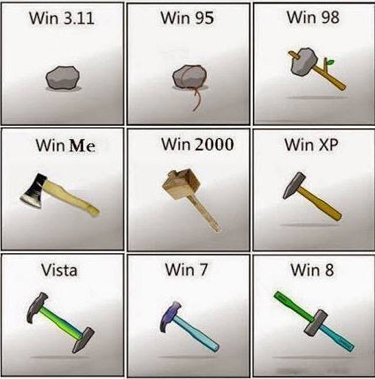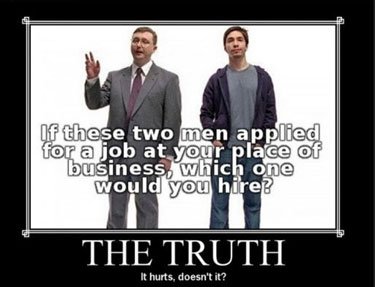Windows XP’s Iconic Wallpaper
Bliss, Charles O'Rear, Microsoft, Photography, Photoshop, Windows
Apple Vs. PC
Apple, Apple Vs. PC, Microsoft, Technology, Windows
Jason Stewart (a self-described Apple addict) does not have much good to say about the current (incredibly expensive) MacBook Pro.
As Dan Ackerman at CNet noted, the Retina Mac “feels like a rest stop on the road to somewhere else,†a place where we truly get thin, light and beautiful. Already, the Samsung Series 9 is smaller and lighter. And many of the rest of the radical changes are more marketing hype than features. The asymmetrical fan blades that were going to revolutionize quiet laptop cooling? If you try real hard, you might hear a trivial difference. What about the “All Flash Architecture� In other words, whereas before you had a choice between a fast, but ridiculously expensive SSD drive, or a cheaper, larger capacity conventional hard drive, now you can only have the SSD drive. Only Apple could successfully market that limitation as a revolutionary feature.
Of course, if you need to connect an Ethernet cable you better shell out extra for a dongle and hope you can find it when you need it. Need to watch a movie on disc or load a program or content the old fashioned way? Apple has just the extra accessory to sell you for that, too, since it is no longer included.
The new MacBook Pro with Retina display is a nice computer. The screen is innovative at a cost of both dollars and features. Whether it’s worth the substantial premium (more than $4,000, fully loaded) is a personal decision. Apple has never been accused of catering to the wish lists of the masses, and this is no exception. It has staked its claim on a new display standard and if that means trade-offs, take it or leave it.
———————————-
Meanwhile, Harry McCracken contends that the Mac world and the PC world are already very different and may soon becoming even more so.
When I sat down to review Apple’s new Retina-display MacBook Pro, I instinctively wanted to compare it with similar Windows laptops. I wanted to discuss how the specs stacked up and whether the price seemed fair. I hoped to contrast its industrial design with those of its closest counterparts.
Then it dawned on me: there are no similar Windows laptops. …
while Apple remains the most influential computer maker in the business, the rest of the industry has chosen to ignore some of its design innovations. When it started sealing up its portables a few years ago — eliminating the ability to easily swap in batteries, RAM and hard drives — I thought that other hardware makers might follow along. For the most part, they haven’t. …
[I]f Microsoft has its way, PCs and Macs are about to get more different than they’ve been in decades. For all of the interesting things about the new MacBook Pro, it’s a straightforward notebook computer based on a form factor that’s been around for 30 years. Apple seems to be content to let Macs be Macs, while the iPad goes places that computing devices never have before.
With Windows 8, however, Microsoft is trying to reinvent the PC from scratch. The Metro interface has little to do with the basic concepts that Windows 7 and OS X share, and it’s conceivable that a bunch of long-standing form factors that have never quite worked, such as touchscreen PCs and laptops that convert into tablets, will finally take off. If they do, and Apple doesn’t push the Mac in the same direction, the average Windows PC could end up having very little in common with any Mac.
PC Problem Fixed
Blog Administration, Linux, Technical Difficulties, Technology, Virginia, Windows
Happily, my self-inflicted partition disaster proved easy to get fixed.
I concluded that fixing the problem required using the kind of utility programs only PC repair shops have on hand to get in and eliminate that GRUB Linux boot-loader, so I hauled it down to Dok Klaus in Warrenton.
Klaus had it fixed the same day and only charged me for one hour of service.
As PC problems go, it was ultimately minor. Now I have my entire hard drive to play with.
How Dumb Am I?
Blog Administration, GRUB, Linux, Technical Difficulties, Technology, Windows
NYM readers may at least be amused.
It’s like this. I bought a Sony Vaio laptop a good while back. It was a bargain, but it came with Vista installed.
At that particular moment in history, I was feeling experimental. I felt like playing with Linux, and I had a hankering to see if I could possibly adapt to the MAC OS environment, one button mouse, all that. So I got a free copy of Ubuntu and bought a copy of Leopard on Ebay. I had been reading that it was possible to install Leopard on a Vaio with some fiddling.
None of this worked out for me.
Leopard could not relate to the notebook’s videocard, and I simply gave up and installed XP on the second hard drive partition. I wasted hours trying to use Linux, but it was just too much trouble to overcome the absence of a readily available driver for the wireless modem. Linux worked fine. It just could not contact the Internet.
So there I was with 80 gb of my hard drive devoted to a Linux installation I was not actually using. But, hey, I still had about 60 gb with Win XP on it, which was working fine.
But, over time, that 60 gb was beginning to fill up. I trashed the games I wasn’t actively playing and purged several large programs. Then, I started moving all the image files off the PC onto various backup drives. But, finally, I had just installed Lightroom and Visio, and C: was getting close to full again. There were getting to be fewer movable items. I got to thinking last night that I ought to do something about all this.
So I Googled on the phrase “eliminate partition” and, lo and behold, there was a link to a discussion explaining that you could do that by hitting START>Control Panel>Administration Tools>Computer Management>Storage>Disk Management, then all you had to do was right click on the offending 80 gb Linux Partition, and select Delete.
What could possibly go wrong? I thought to myself. Ubuntu goes bye bye. The 80 gb Linux Partition returns to being part of the ordinary C: drive. I have lots of disk, and everyone is happy. So I hit “delete.”
Then I looked at the properties of the C: drive, so I could admire all the great new space I had created.
Hmmm. No change. The only difference was that second partition was now unlabeled.
I guess I need to reboot before the change goes into effect, I concluded. This would be the moment of truth. If I had screwed the pooch, I would soon find out. But, how likely was that?
My keen mind, doubtless impacted by age and senility, had overlooked the obvious consideration that I had installed Ubuntu first, and Ubuntu had put itself in charge of the boot-up process.
So the PC turns off, starts to come up, and GRUB (Ubuntu’s Grand Unified Boot-Loader) starts looking for that now-unlabeled Linux Partition, can’t find it, and sits there… permanently, announcing Error 17.
Error 17 means that GRUB can’t find the partition it’s looking for. It then freezes and sulks.
So, this is how to disable your PC and create a fine opportunity to research sub-operating system levels of PC operation in both Windows and Linux lands.
Blogging will be less frequent for a few days. I’m using an older, slower machine.
Bad News for Redmond
Chrome, Google, Google Chrome, Microsoft, Open Source, Software, Technology, Vista, Windows

Lifehacker tells us that Google will be be releasing its free, open-source Chrome Operating System later this year. Google says:
We’re designing the OS to be fast and lightweight, to start up and get you onto the web in a few seconds. The user interface is minimal to stay out of your way, and most of the user experience takes place on the web. And as we did for the Google Chrome browser, we are going back to the basics and completely redesigning the underlying security architecture of the OS so that users don’t have to deal with viruses, malware and security updates. It should just work.
Chrome OS is going to be netbook oriented in its earliest version, and the idea apparently is ultimately to replace PC software with on-live Google applications like Gmail and Google Docs.
Persuading users to give up the familiar isn’t easy, but Microsoft has done a fine job lately, particularly with Vista, in creating a real opportunity for anyone able to offer more speed and convenience.
Conficker C to Strike April 1st
Conficker, Cybersecurity, Downadup, Downadup.ad, Hacking, Malware, Technology, Viruses, Windows
The Conficker worm (also known as Downadup.AD) appeared last October targeting (surprise! surprise!) Microsoft Windows vulnerabilities common to 2000, XP, Vista, et al.
It has contaminated more than 9 million PCs worldwide, hitting 1.1 million on a single day last January. Conficker has shut down the operations of the French Air Force, 24 RAF air bases, and 75% of the Royal Navy, and infected hundreds of computers serving Germany’s Bundeswehr and Defense Ministry.
New York Times:
The program grabbed global attention when it began spreading late last year and quickly infected millions of computers with software code that is intended to lash together the infected machines it controls into a powerful computer known as a botnet.
Since then, the program’s author has repeatedly updated its software in a cat-and-mouse game being fought with an informal international alliance of computer security firms and a network governance group known as the Internet Corporation for Assigned Names and Numbers. Members refer to the alliance as the Conficker Cabal. …
An examination of the program reveals that the zombie computers are programmed to try to contact a control system for instructions on April 1. There has been a range of speculation about the nature of the threat posed by the botnet, from a wake-up call to a devastating attack.
Researchers who have been painstakingly disassembling the Conficker code have not been able to determine where the author, or authors, is located, or whether the program is being maintained by one person or a group of hackers. The growing suspicion is that Conficker will ultimately be a computing-for-hire scheme. Researchers expect it will imitate the hottest fad in the computer industry, called cloud computing, in which companies like Amazon, Microsoft and Sun Microsystems sell computing as a service over the Internet. …
Several people who have analyzed various versions of the program said Conficker’s authors were obviously monitoring the efforts to restrict the malicious program and had repeatedly demonstrated that their skills were at the leading edge of computer technology.
For example, the Conficker worm already had been through several versions when the alliance of computer security experts seized control of 250 Internet domain names the system was planning to use to forward instructions to millions of infected computers.
Shortly thereafter, in the first week of March, the fourth known version of the program, Conficker C, expanded the number of the sites it could use to 50,000. That step made it virtually impossible to stop the Conficker authors from communicating with their botnet. …
A report scheduled to be released Thursday by SRI International, a nonprofit research institute in Menlo Park, Calif., says that Conficker C constitutes a major rewrite of the software. Not only does it make it far more difficult to block communication with the program, but it gives the program added powers to disable many commercial antivirus programs as well as Microsoft’s security update features.
“Perhaps the most obvious frightening aspect of Conficker C is its clear potential to do harm,†said Phillip Porras, a research director at SRI International and one of the authors of the report. “Perhaps in the best case, Conficker may be used as a sustained and profitable platform for massive Internet fraud and theft.â€
“In the worst case,†Mr. Porras said, “Conficker could be turned into a powerful offensive weapon for performing concerted information warfare attacks that could disrupt not just countries, but the Internet itself.â€
The researchers, noting that the Conficker authors were using the most advanced computer security techniques, said the original version of the program contained a recent security feature developed by an M.I.T. computer scientist, Ron Rivest, that had been made public only weeks before. And when a revision was issued by Dr. Rivest’s group to correct a flaw, the Conficker authors revised their program to add the correction.
Although there have been clues that the Conficker authors may be located in Eastern Europe, evidence has not been conclusive.
Information Week links this removal tool.
Alarmingly, TrendMicro’s virus encyclopedia entry is “temporarily unavailable.”
PC versus Mac
Apple, MAC, Microsoft, PC, Technology, Windows
Freddie advises that buying a Mac doesn’t really prove you’re cool. (Steve Jobs must really hate this one.)
[A]ll of these greater philosophical underpinnings that people attach to PC vs. Mac are just self-aggrandizing nonsense. Buying the computer from company A doesn’t, as a matter of fact, say anything about you, just like buying a computer from company B doesn’t say anything about your counterparts. As I have said many, many times, there are good things about Apples and good things about PCs. If it makes sense to you to buy an Apple, go with god. And many Apple owners do just that, buy a product, use it and enjoy it. I’ve considered getting an Apple laptop in the past and may in the future. But it amazes me, absolutely amazes me, the number of Apple owners who lack the clarity or self-awareness to realize that purchasing a commodity from a enormous, soulless corporation that is also owned by several million other people doesn’t make you a unique and beautiful snowflake. Apple has a better PR campaign, better advertising and a more gullible, credulous customer base. That’s it. It’s got nothing to do with individuality or noncomformity. I know many people are probably saying that this is a completely banal thing to say but I am consistently astounded by otherwise smart people who will tell you different.
Hat tip to Andrew Sullivan.
Why the Microsoft Layoffs?
Microsoft, Vista, Windows
InfoWorld points to Vista.
Windows Vista has been trouble for Microsoft perhaps since the operating system’s beginning. And this last quarter was certainly no exception. Despite a dip in client software revenue, however, one analyst says the workforce reduction Microsoft detailed on Thursday is healthy — at least from enterprise IT shops’ perspective.
When Microsoft released its earnings report on Thursday, the company indicated not only that it would lay off up to 5,000 workers or 5 percent of its total headcount but also that software client revenue — as in Windows Vista — sank by 8 percent.
“Windows Vista didn’t do well. Based on our data, a lot of clients are skipping Windows Vista,” says Neil MacDonald, an analyst at Gartner. Indeed, nearly every other major analyst firm found a similar lack of Vista adoption, with Forrester Research likening the OS to the failed New Coke.








